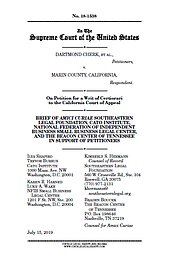Learn more about Cato’s Amicus Briefs Program.
California is having a well-known housing crisis. Many cities and counties have enacted inclusionary housing ordinances that require developers to set aside housing for low-income residents or simply pay money as a precondition to getting a permit. The Cherk family owns an undeveloped residential lot in Marin County, and, as a precondition to receiving a permit to split their lot in two, the county demanded the Cherks pay $39,960 for inclusionary housing. The county demanded the exaction even though it was undisputed that the Cherks’ lot-split neither caused nor had an adverse impact on the region’s affordable housing problem. In fact, the split would increase the amount of land for affordable housing. The county seemed to be simply demanding money from the Cherks without any public policy justification.
The unconstitutional-conditions doctrine says that the government cannot force people to waive their constitutional rights as a condition to receiving a government benefit. But that is exactly what the state of California did to the Cherk family. The Cherks challenged the fee in the California Court of Appeals, but the court held that the fee was constitutional, in large part because it was legislatively prescribed rather than being imposed ad hoc by an administrative agency. That reasoning is flawed, however, and wrongly facilitates the taking of property without just compensation, violating the Takings Clause of the Constitution.
A taking occurs when either the government directly takes private property, regulates the property so that the effect is equivalent to a direct taking, or puts unreasonable conditions on a property owner’s right to use their property how they wish. The last category falls under the unconstitutional-conditions doctrine. It should not matter whether it was an administrative agency or the legislature that imposed the condition. When it comes to protecting people’s constitutional rights, this is a distinction without any meaningful difference.
The Cherks have asked the Supreme Court to review their case. The Cato Institute, along with Southeastern Legal Foundation, NFIB Small Business Legal Center, and The Beacon Center of Tennessee, have filed a brief in support of their petition. We argue that the Court should clarify that there’s no meaningful difference between a legislative or administrative exaction. That’s what the Supreme Court has said in many cases. The Court developed the unconstitutional-conditions doctrine in cases that all involved legislatively prescribed conditions, not administrative decisions. In those cases, the Court, recognizing the fundamental importance of property rights, applied a high level of scrutiny to the conditions and held that they were unconstitutional. Despite those precedents, many lower courts have allowed state and local governments to impose burdensome preconditions to property development without properly analyzing whether the exactions met the proper level of constitutional scrutiny.
Because the lower courts have split on this issue, with some properly applying the unconstitutional-conditions doctrine to legislative acts, and others, including the California Court of Appeal, choosing to ignore Supreme Court precedent in this area, the Supreme Court should take the Cherks’ case to resolve this discrepancy. Whether a legislature or an agency demands an exaction doesn’t matter, and governments shouldn’t be given a back door to evade the requirements of the Takings Clause, because they’ll definitely use it.

This work is licensed under a Creative Commons Attribution-NonCommercial-ShareAlike 4.0 International License.
